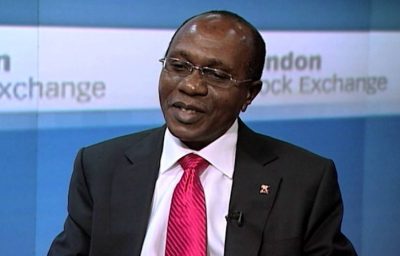Nigeria’s financial system getting stronger, says Emefiele
THE Nigerian financial system is getting stronger and more resilient with capital buffers and liquidity in the sector improving, the Central Bank of Nigeria (CBN) Governor, Godwin Emefiele, has said.
Speaking yesterday at the 54th Annual Bankers Dinner held in Lagos, he said industry wide Capital Adequacy Ratio (CAR) has increased from 10.2 per cent in December 2017 to 15.5 per cent in September 2019.
The CBN boss said the percentage of non-performing loans in the banking sector has declined from its high of 14.7 per cent in January 2017 to under seven per cent as at October 2019.
Continuing, Emefiele said credit conditions in the banking system have improved by our new policy measures announced in June 2019 which requires banks to maintain a minimum 65 per cent loan to deposit ratio.
“In addition, banks are now able to recover delinquent loans from a customer’s accounts in other banks. As a result, gross credit increased by N1.16 trillion between May and October 2019 and this increase has been along all critical sectors of economy such as manufacturing, agriculture, telecom services and the creative industry to mention a few. These measures have placed our banks in a much better position towards supporting a stronger economic recovery,” he said.
Emefiele, who spoke on the theme: “Delivering a strong Sustainable Growth for the Nigerian Economy”, said the impact of a tighter monetary policy regime, attractive yields in the money market and our efforts at supporting domestic productivity in the agriculture and manufacturing sectors; along with improvements in oil production, have supported continued foreign exchange inflows into the Nigerian market.
He disclosed that in the Investors’ and Exporters’ Forex Window, over $60 billion worth of transaction has taken place since the inception of the window in April 2017, and our foreign exchange reserves are above $40 billion as at October 2019, relative to its low point of $23 billion in October 2016. We have been able to build our reserves in the midst of lower oil prices, as strong reserves aid the confidence of domestic and external investors. Today, our current stock of external reserves is able to finance 9 months of current import commitments.
“With a moderated inflation rate, positive GDP growth and improvements in our external reserve position, the naira-dollar exchange rate at the I&E window has remained stable for the past 29 months at N360 – $1 and we have witnessed significant convergence in the exchange rate across the various market windows”.
Continuing, Emefiele said: “Headline inflation declined from its high of 18.7 per cent to 11.08 per cent in August 2019. We recently noticed an uptick in headline inflation which stood at 11.61 percent in October 2019 partly driven by cost – push factors such as the recent border protection measures of the Federal Government. We believe this effect will be temporary, as efforts are currently being made to induce greater production of staple food items. However, core inflation as at October 2019 is now under 9 percent. This decline in inflation has been due to our maintenance of a tighter monetary policy rate at 13.5 percent, and improved inflow of foreign exchange”.


